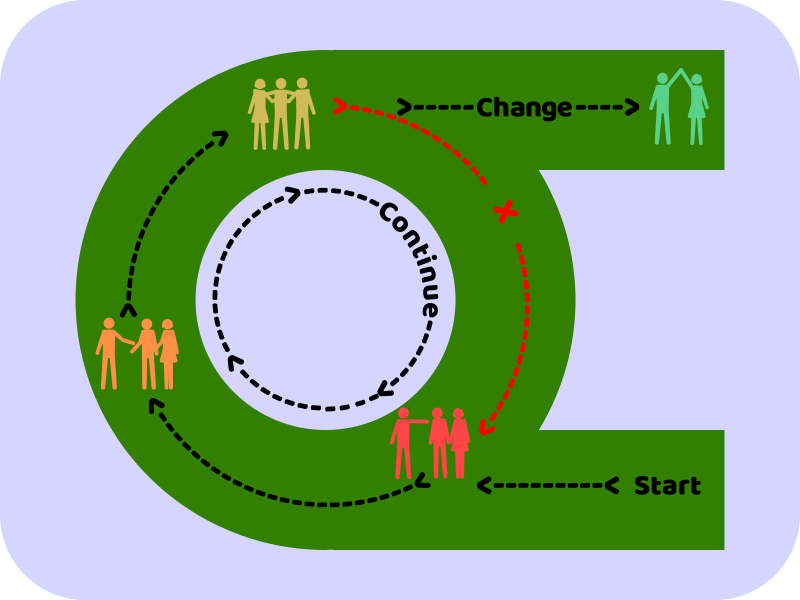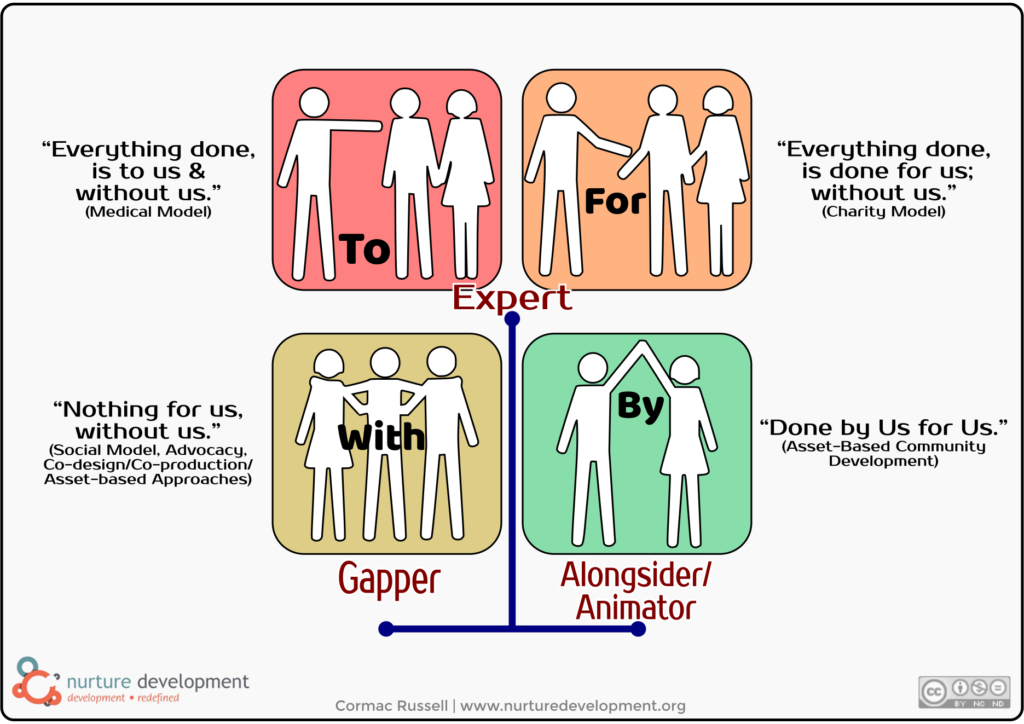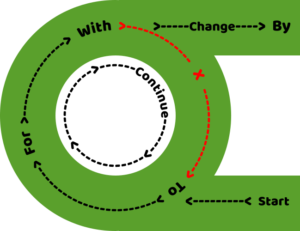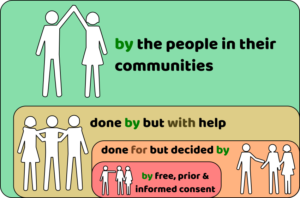
Off the Roundabout
In October we summarised the TO/FOR/WITH/BY domains which contrasts four different ways of doing within or to a community space. TO/FOR/WITH/BY can be useful as a tool to recognise and describe the approach that could be being done to your community, or perhaps done by your organisation to a community.

In this blog we are going to add a little more discussion about TO/FOR/WITH/BY and encourage heading towards the BY direction; whether you are starting out, aiming to develop an existing approach or considering ways current practice could be improved.
All too often, in many places we find a pattern that lends itself to unsustainable approaches. Quite often it is carried out with sincere good intentions, yet the result is disappointment and disillusionment for communities; raised hopes for better community space see only the refreshing of buildings, industrial estates or retail facilities in an area. In years gone by, this was often the heavy handed development that was done TO a community space that turned it into a development primarily for the benefit of others. With progress made over recent decades, this distant and top down approach is being more ably questioned in many parts of society, however with these questions it becomes all the more important to use the experience gained to look deeply into whether current choices are going to achieve the sustainable strengthening of community life that is distinctly missing in the results of prior TO models of effecting change.
 Every decision that is about to be made is an opportunity to break out of an old cycle. One that might well have been draining the vitality of communities for many years. The cycle is one all too many people are familiar with: the flip flopping shift from Centralisation to Decentralisation and back again. The shift may happen over different lengths of time, sometimes generations, but results from common failures to actually address the fundamental problems that presaged a new effort. That effort could have addressed symptoms but over time with diminishing investment and removal of external support remaining problems rise back into visibility, and that leads to recriminations, disagreement and regret about aspects of the approach taken. People within this trap enter into a process of identifying systemic failure that, if taken on board, shifts the focus of the next attempted approach; e.g. from greater community involvement to stronger governance to externalised provisioning and back again. This results in the TO -> FOR -> WITH -> TO roundabout. The most regrettable aspect about this cycle is that the ways of exiting are being missed and the ways of continuing on with it are being seen as new beginnings.
Every decision that is about to be made is an opportunity to break out of an old cycle. One that might well have been draining the vitality of communities for many years. The cycle is one all too many people are familiar with: the flip flopping shift from Centralisation to Decentralisation and back again. The shift may happen over different lengths of time, sometimes generations, but results from common failures to actually address the fundamental problems that presaged a new effort. That effort could have addressed symptoms but over time with diminishing investment and removal of external support remaining problems rise back into visibility, and that leads to recriminations, disagreement and regret about aspects of the approach taken. People within this trap enter into a process of identifying systemic failure that, if taken on board, shifts the focus of the next attempted approach; e.g. from greater community involvement to stronger governance to externalised provisioning and back again. This results in the TO -> FOR -> WITH -> TO roundabout. The most regrettable aspect about this cycle is that the ways of exiting are being missed and the ways of continuing on with it are being seen as new beginnings.
New beginnings are attractive, they offer the chance to re-evaluate and attract new interest and investment but without introspection and honesty the sustainable and strengthening steps forward will again be missed.
Two introspective questions:
- As a member of a community – can you describe how you have been able to participate and how has that helped or hindered what you wanted to achieve?
- When starting or considering transitioning a programme or initiative – can you recognise what role you are about to take and how that will impact what you are aiming to do?
 While all four domains have their place, they sit at a moral crossroads. Where decisions about power and the practices of subsidiarity are critical. In a democracy things done TO and FOR us must be authorized by the demos (citizenry) in genuinely participatory and productive ways. In practical terms this can only be achieved by:
While all four domains have their place, they sit at a moral crossroads. Where decisions about power and the practices of subsidiarity are critical. In a democracy things done TO and FOR us must be authorized by the demos (citizenry) in genuinely participatory and productive ways. In practical terms this can only be achieved by:
- Starting with what residents can do themselves as an association of citizens, without any outside help. (BY the people and their communities)
- Then looking at what they can do with a little outside help. (WITH the people and their communities)
- Finally, once these local assets have been fully connected and mobilized, citizens decide collectively on what they want outside agents to do for them. (FOR people and their communities)
Where things must be done TO people, if democracy is to be sustained the principle of Free, Prior, Informed Consent must apply.
The order is critical. When we start with the third, (doing FOR or TO) as often is the case in traditional helping endeavours, we preclude citizen power, and therefore choose technocratic solutions over democratic ones. Thus losing the opportunity to address problems that caused the symptoms which originally motivated action.
Rashid Mhar & Cormac Russell
